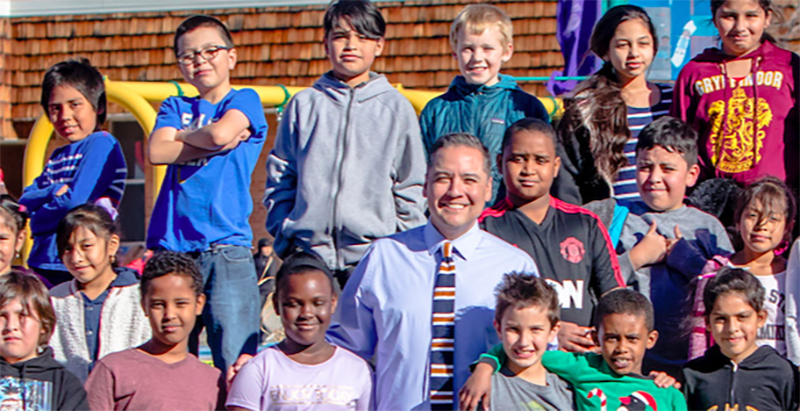Denver Principal Sees Pandemic as Chance to Double Down on Social-Emotional Learning, Explore Anti-Racism

The triple pandemics of the coronavirus crisis, record unemployment, and a long overdue reckoning with our country’s institutional racism have created a unique opportunity for educators such as myself.
In Denver Public Schools, elementary school students fully returned to in-person learning Oct. 21 after seven weeks of remote learning. Teachers worked hard to create relationships with children and families before they were able to meet in person. I have marveled at the resilience of connection as children and teachers formed bonds through the use of Google Meets, Seesaw, and Google Classroom.
Despite the many challenges, COVID-19 has surfaced the chance to truly disrupt long-standing inequities in the education system. We can prioritize the voices, perspectives, and well-being of Black and Brown children who have been marginalized for too long. We can rethink many of our assumptions, notably the primacy of standardized state exams that has led to pernicious drill-and-kill test prep that is the antithesis of learning. We can address basic questions that have largely been neglected, such as:
- How will we connect with students and families whose voices have not traditionally been elevated? How will we use their perspectives to improve and deepen school-family-community partnership?
- How will we work to ensure that school norms, values, and cultural representations reflect and affirm the experiences of students, families, staff, and community partners?
- What actions can we take to ensure that our approach to social and emotional learning (SEL) affirms the cultural and linguistic backgrounds of the students and families we serve?
As a person of color, I especially welcome these opportunities. This year at Samuels Elementary, my school in southeast Denver, our long-standing commitment to SEL will help power these conversations and drive our work to create a school community where all students thrive.
Thankfully, we have a solid structure to build on. Having prioritized SEL for the past four years, our teachers, assistant principal, SEL coaches, and afterschool care staff are collaborating to create equitable learning environments in support of all students. We also have expanded services to hone in on and address the specific needs of our students and families through our Wellness Team, which consists of a full-time school nurse, full-time school psychologist, full-time counselor, and full-time restorative approaches practitioner.
We’re all working together to create a common language, common beliefs, common practices, common support, and common understanding of what those supports look like at the school level, so that we can maximize the relationships that we have with children.
We’re not flying solo. With help from the Wallace Foundation, we benefit from numerous external partnerships that reinforce and supplement our work once the formal school day is over. Notably, Jewish Family Services provides access to mental health therapy and wraparound supports for families. Guidance from the Collaborative for Academic, Social, and Emotional Learning (CASEL) has been informing our long-term efforts, and most recently, a new resource from CASEL and 40 other organizations is supporting those strategies.
We are supporting students with an evidence-based SEL curriculum that teaches such core skills as self-awareness and relationship skills. Mindfulness practices help students reflect on their emotions and calm down if needed. We are balancing our traditional focus on academics with much more intentional work in creating safe environments where students feel supported, connected, and loved. Our focus on relationship-building and personalization is all the more imperative, given our staggering mobility rates; last year nearly half of our pre-K through 5th-grade students were new during the school year.
We also are supporting adults in multiple ways, knowing that professional learning, reflection, and self-care are essential for effective student support. Six additional days of planning time allow us to better anticipate and meet the needs of our very diverse students (over 40 languages are spoken), 80 percent of whom are classified as low-income. Regular online conversations have helped staff stay connected and resilient during these trying times.
And the biggest growth opportunity ahead is dedicating more intentional exploration of anti-racism within our schools. We will be reexamining our own biases, decisions, and actions. We will explore how they contribute to systemic racism in order to move ourselves and others toward racial equity and justice. Teachers will be enriching their curriculum with a much more diverse set of texts and approaches. Students will be more actively involved in designing their own learning through projects, discussions, and similar activities.
Students also will have many more opportunities to demonstrate leadership. In each class, students generate a Social Contract and student leaders monitor progress toward the agreed-upon norms. At the school level, SEL Youth Leaders plan, support and lead school events including Culture Camps, Specials Nights, and Family Nights.
We are closely measuring progress and holding ourselves accountable for growth—not just with academic test scores but with broader measures including SEL surveys.
Our growing ecosystem of educators, families, community partners, and students is taking advantage of this pause to refocus on equity and embrace this critical work. Our students will benefit. Our staff will benefit. Our communities will benefit.
Cesar Rivera is principal of Samuels Elementary School in southeast Denver.
Get stories like these delivered straight to your inbox. Sign up for The 74 Newsletter

;)
